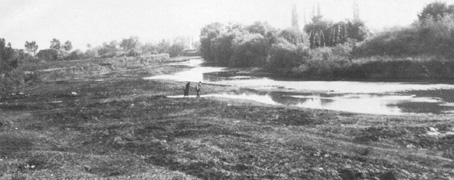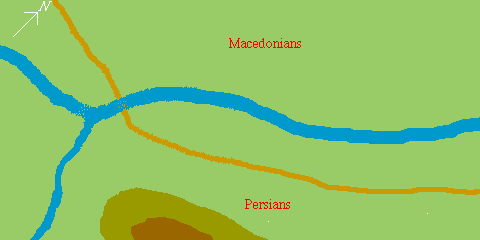

Diodoros, while being the only extent source to report the "already crossed the river" scenario clearly was following a wider body of sources that claimed this happened. Justin for instance, despite following the traditional "defend the river bank" approach, nethertheless has the battle take place in the plain rather than between the river and the nearby rising ground that Arrian and Plutarch report suggesting he (or rather Trogus, since Justin had was essentially a condensor of Trogus' work) had access to both versions of the story and incorporated elements of both into his version of the battle. It is a great pity that Curtius' account of the battle is lost, as Curtius is in many ways a fuller version of Diodoros.
With Diodoros being the only dissenter, it is natural that most historians have followed the usually more reliable Arrian in his account of the battle, especially when Plutarch and Justin, on the whole, support him.
The traditional account, essentially that of Arrian, supplemented by Plutarch and Justin, has the Persians defend the bank of the river with their cavalry, while the infantry stood on the high ground to the rear (Plutarch has the infantry defend the bank too, with only the Greeks mercenaries making their final stand on the high ground, a fairly significant departure from Arrian that has not recieved as much attention as it should have in my opinion). The Macedonian cavalry forced their way into the Persians, and eventually put them to flight after a hard fight, upon which the Persian infantry were essentially cut down.
Hammond offers the best discussion of the terrain, but his reconstruction of the battle fails to account for several important factors, most noticeably Arrian's report of Alexander's manoeuvre that saw him lead his cavalry upstream. Nik Fincher has come up with a theory to explain this manoeuvre that I find most attractive indeed. According to Nik's thesis, the manoeuvre was not merely an incline of each squadron as it crossed the Granikos in the face of the Persians (for there is no reason to do so if the end result is just to charge in frontally, as the end result would be the same), but rather Alexander leading his squadrons in column upstream along the river bed past the Persian flank, and once the Persian flank had been turned, turning into line, and emerging from the river bed to confront the cavalry that the Persians had presumably brought across in response.

A glance at the photo above taken by Hammond of the river in 1976 shows that this scenario is not at all implausible. The river has little water when not in flood, and considerable flat space in the river bed; conditions are likely to have been broadly similar 2000 years ago. There is space for troops to move along the river bed, yet not so much space as to escape the javelin casts of troops defending the far bank as reported by Plutarch. The very height and vegetated state of the banks would however serve as an impediment to any defenders trying to physically stop the Macedonians from moving along the river bed; they would have to descend the banks relatively slowly, possibly as individual, and cross the river river to do so, and would be very vulnerable to counter attack.
Hence the Macedonian cavalry could have quite easily moved upstream unopposed to turn the Persian position. As the rest of the Macedonian troops were crossing the river frontally, "taxeis by taxeis" as Arrian says, there was no option of simply following Alexander's troops along the river bank since this would have left that part of the river bank undefended; and it would have in any case been a difficult manoeuvre to pull off since the river bank would have prevented any forwards movement before turning - horses and men would have had to turn on the spot.
The only way of confronting such an outflanking move would have been to bring up a fast-moving (ie. a cavalry) reserve to deal with the threat; either one already in being, or an ad hoc grouping formed from troops defending part of the river bank that was not being contested, with the former option being the most likely of the two. This theory has another attraction in that it accords with Diodoros's statement that Alexander fought with his back to the river.
This scenario will take Nik's theory into account therefore. The forces remain the same as in my other Granicus scenario, but the scene of the battle is shifted slightly to the southwest and rotated 45 degrees to reflect the different Macedonian axis of advance.

Fighting the battle:
The battle was fought in May/June, or Spring in DBM terms. The Granicus, flowing northeastwards towards the Black Sea, could well have still been swollen by snow-melt, although still crossable in many places. Its bank is recorded as being muddy and slippy, and we might accordingly grade its fordablity as 'tricky'. As Hammond's photo shows however, the river is a narrow stream at this time of year (he looked at it on June 15th, 1976), flowing between wider dry clay banks, although thousands of men and horse crossing it would probably have soon turned its banks wet and slippery. Hammond himself suspects that the ancient river might have held more water, due to modern irrigation works, and since the battle was probably fought earlier than the 15th of June, it would probably have been slightly fuller because of the earlier season.
However, playtesting has revealed that crossing a tricky river in DBM with more than one element is essentially impossible if the enemy moves to defend the bank, so it needs to be graded easy, but depicted just over 100 paces wide in compensation. However, the river above the confluence with the Biga would be even less of an obstacle, and this should be depicted less than 100p wide so that it takes only one bound to cross. In DBM, movement along a river(bed) is impossible, so to simulate this possibilty, a second ford should be depicted across the Biga just by its confuence with the Granicus. This will allow Macedonian troops to move easily to its far side along the Granicus, so that troops apparently marching along the river bank should be understood to be marching along its bed instead: zones of control do not extend across water features so that the Persians can not stop such a movement without crossing the river themselves.

The road crosses the river by a ford, and the low hill/ridge to the Persia rear upon which the Persians' Greek Mercenaries made their last stand should count as a gentle hill with smooth slopes. (The plain was ranged with low foothills to the east, though these would be too far away to depict on the tabletop).
The time is early morning, say 8 a.m., with fair weather. The Persians count as defending, and so deploy first, along the southern edge of the battlefield. The Macedonians deploy on the northern side of the battlefield; neither side may deploy any troops in the triangle of land between the two rivers. Flank-marches are not permitted. Despite the Persians defending they take the first bound, allowing them to move forwards to defend the river bank; they may not however move any troops into the trangle of land between the two rivers unless the Macedonians have already done so; this gives Alexander a chance to strike their first if he so desires, with the Persians beliveing their flank is safe until he makes his move.
Special rules:
The odds of straight military victory are weighed against the Persians. However, as the initial battle of a campaign, the Persians need not win the battle to score an important strategic victory - merely damaging the Macedonian army may be enough to win the war. To gain a complete victory, the Macedonians must break the Persian army without one of their own commands being broken, Alexander's element must not only survive but also destroy at least 15 AP of undemoralised enemy in close combat (this is to encourage the player to emulate Alexander's actions. A cautious Alexander wouldn't have conqured all that he did).
A marginal Macedonian victory will be achieved if the Macedonians break the Persian army without one of their own commands being broken, and Alexander's element survives, but doesn't destroy at least 15 AP worth of undemoralised elements in frontal combat, or if the Macedonians break the Persian army with one of their own commands being broken, while Alexander's element survives, destroys at least 15 AP of undemoralised enemy in close combat plus Memnon's element is destroyed.
The Persians gain a complete victory by breaking the Macedonian army, or if Alexander's element is destroyed (in frontal combat only), or if the Macedonians lose all 8 Bg elements (the campaign won't get far without supplies or money).
The Persians gain a marginal victory if Memnon's element is not destroyed (Memnon was the only decent general the Persians had, without him, they have much reduced chances in the future), AND, in addition, the Persians either A, break a Macedonian command (damaging Macedonian morale, and encouraging uprisings at Greece by demonstrating the Macedonians can still be beaten), or B, destroy at least four Macedonian Bg elements (seriously hampering the Macedonian advance).
Any other result is a draw.
As an alternative rule, a general such as Alexander or Memnon is not autmotically killed if destroyed in close combat, and not automatically safe otherwise. In the case of a general's element being destroyed; after taking the requisite PiP-checks next bound (the troops won't know immediately what happened) roll a die. Add 1 if the element was destroyed in close combat with (at least some) enemy mounted troops; deduct 2 if destroyed when not in close combat with enemy. On a 5 or more, the great man is killed outright. On a 2 or less, he escapes barely injured. Next bound before PiPs are rolled, his general's function is transfered to any one friendly element of the same command within 200p (if none available, he has to hide until the battle is finished). If a C-in-C this will allow the army to swap PiP dice again; it won't return a demoralised command to undemoralised however. On a 3 or 4, he is severely wounded and manages to make it off-field. He is treated as lost for purposes of the game, but not for victory conditions.

Notes:
See my alternative scenario for these.
Return to my homepage index